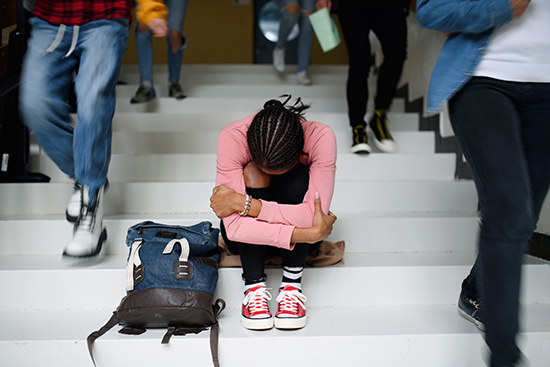Since the beginning of the pandemic, a surge in mental health problems in young people has been observed. After extensive research, experts are voicing their concerns about the situation.
Typically, every year about 4 percent of the Dutch under-18s seek the help of a psychologist or a psychiatrist due to mental health problems. However, since the beginning of the pandemic, this number has increased to 6 percent. And it seems like this is an underestimation of reality, because of the lack of centralized registration in mental healthcare. According to professor Arne Popma, who teaches Child and Youth Psychiatry at the Amsterdam Medical Center, tens of thousands of extra mental healthcare admissions can be expected in the coming years. Complaints have also increased among young adults, aged 18 to 25 years old. Youngsters report that the quality of their life has deteriorated since January 2021. According to research conducted by Trimbos Institute, a quarter of all respondents reported that they were experiencing a worse mental state than before. In October 2020 this was true for 1 out of 6 people from this age group.
The main reasons for the decrease in psychological well-being are the restrictions on social life and the lack of perspective for the future. Good social support is a valuable protective factor at any age, but the current situation in the world restricts the possibility to seek out contact with other people. According to professor Eveline Crone from the Erasmus University of Rotterdam, it is also extremely important for young people to have a sense of control, to be able to create change in society, and to feel respected. These feelings might be somewhat diminished during the current situation. The most prominent complaints that both younger and older age groups experience are insomnia, loneliness and stress-related problems. Symptoms of depression, anxiety, and eating disorders were reported to be on the rise. Interestingly, while fear of the virus has been listed as another negative factor impacting the mental health of adolescents, the research conducted by Trimbos Institute did not show a significant increase of fear in young adults aged 20-35 years old.
The problems with providing adequate mental healthcare also seem to increase. For the last six months, there has been a shortage of acute medical care for anorexia patients. They are forced to have their treatment at home or stay at a facility far away from their house. The general waiting time to get help with an eating disorder in Amsterdam, for example, has doubled to 8 weeks. Professor Popma also mentioned that the problem might lie partly in the way the mental health support system is financed. The government has allocated 50 million euros to acute mental healthcare and 225 million to reduce the long waiting lists.
Despite being happy with this financial support, Popma mentions that there had not been enough attention and effort for the prevention of mental health issues before the Covid-19 crisis started. As a result, there is a need for structural improvements in the sector. For instance, since the management of mental health care was taken over by the municipalities in 2015, says Popma, the number of treatment options has increased, but also the costs that patients must pay. And many child and youth psychologists have switched to adult clients, because this seemed a more secure area of practice. In the summer there a new plan for restructuring mental healthcare for children and youth is supposed to be presented. However, according to Popma, it might take years before the system is fundamentally improved.
There is, however, good news. According to the data, the majority of Dutch youngsters is doing all right. Even though the group at risk of mental health problems has become larger since the start of the pandemic, there is still a majority that is not in danger. And, according to the data of Trimbos Institute, 60% of respondents found some positive aspects in the current situation – such as a feeling of togetherness or more tranquility.
If you have been experiencing psychological difficulties recently – do not hesitate to seek help. Your health and well-being are important.
Written by Anastasiia Myronenko
